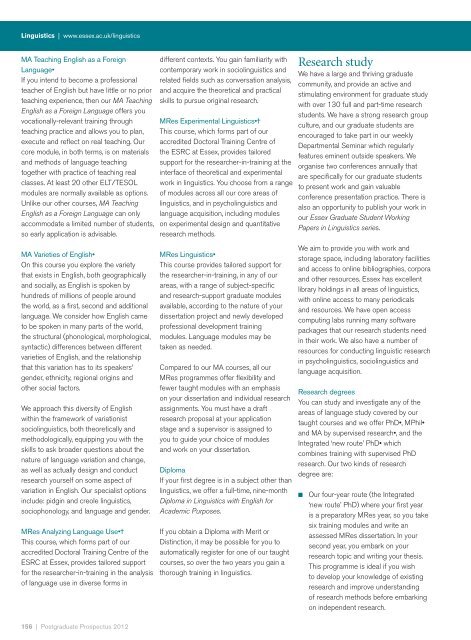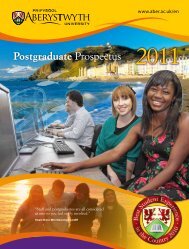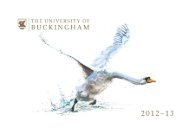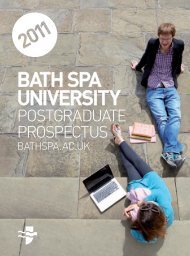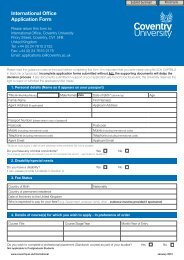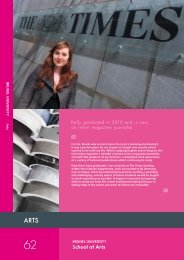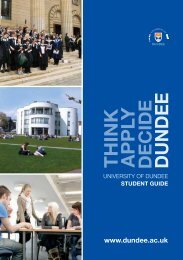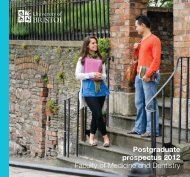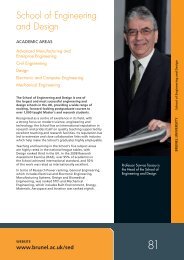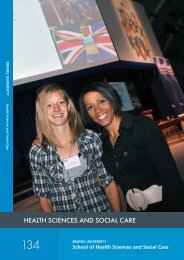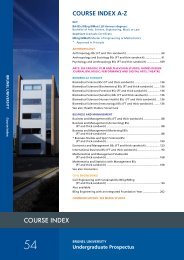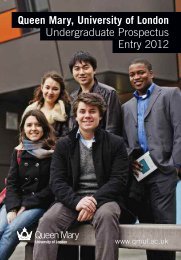Postgraduate Prospectus
Postgraduate Prospectus
Postgraduate Prospectus
You also want an ePaper? Increase the reach of your titles
YUMPU automatically turns print PDFs into web optimized ePapers that Google loves.
Linguistics | www.essex.ac.uk/linguistics<br />
MA Teaching English as a Foreign<br />
Language•<br />
If you intend to become a professional<br />
teacher of English but have little or no prior<br />
teaching experience, then our MA Teaching<br />
English as a Foreign Language offers you<br />
vocationally-relevant training through<br />
teaching practice and allows you to plan,<br />
execute and reflect on real teaching. Our<br />
core module, in both terms, is on materials<br />
and methods of language teaching<br />
together with practice of teaching real<br />
classes. At least 20 other ELT/TESOL<br />
modules are normally available as options.<br />
Unlike our other courses, MA Teaching<br />
English as a Foreign Language can only<br />
accommodate a limited number of students,<br />
so early application is advisable.<br />
MA Varieties of English•<br />
On this course you explore the variety<br />
that exists in English, both geographically<br />
and socially, as English is spoken by<br />
hundreds of millions of people around<br />
the world, as a first, second and additional<br />
language. We consider how English came<br />
to be spoken in many parts of the world,<br />
the structural (phonological, morphological,<br />
syntactic) differences between different<br />
varieties of English, and the relationship<br />
that this variation has to its speakers’<br />
gender, ethnicity, regional origins and<br />
other social factors.<br />
We approach this diversity of English<br />
within the framework of variationist<br />
sociolinguistics, both theoretically and<br />
methodologically, equipping you with the<br />
skills to ask broader questions about the<br />
nature of language variation and change,<br />
as well as actually design and conduct<br />
research yourself on some aspect of<br />
variation in English. Our specialist options<br />
include: pidgin and creole linguistics,<br />
sociophonology, and language and gender.<br />
MRes Analyzing Language Use•†<br />
This course, which forms part of our<br />
accredited Doctoral Training Centre of the<br />
ESRC at Essex, provides tailored support<br />
for the researcher-in-training in the analysis<br />
of language use in diverse forms in<br />
156 | <strong>Postgraduate</strong> <strong>Prospectus</strong> 2012<br />
different contexts. You gain familiarity with<br />
contemporary work in sociolinguistics and<br />
related fields such as conversation analysis,<br />
and acquire the theoretical and practical<br />
skills to pursue original research.<br />
MRes Experimental Linguistics•†<br />
This course, which forms part of our<br />
accredited Doctoral Training Centre of<br />
the ESRC at Essex, provides tailored<br />
support for the researcher-in-training at the<br />
interface of theoretical and experimental<br />
work in linguistics. You choose from a range<br />
of modules across all our core areas of<br />
linguistics, and in psycholinguistics and<br />
language acquisition, including modules<br />
on experimental design and quantitative<br />
research methods.<br />
MRes Linguistics•<br />
This course provides tailored support for<br />
the researcher-in-training, in any of our<br />
areas, with a range of subject-specific<br />
and research-support graduate modules<br />
available, according to the nature of your<br />
dissertation project and newly developed<br />
professional development training<br />
modules. Language modules may be<br />
taken as needed.<br />
Compared to our MA courses, all our<br />
MRes programmes offer flexibility and<br />
fewer taught modules with an emphasis<br />
on your dissertation and individual research<br />
assignments. You must have a draft<br />
research proposal at your application<br />
stage and a supervisor is assigned to<br />
you to guide your choice of modules<br />
and work on your dissertation.<br />
Diploma<br />
If your first degree is in a subject other than<br />
linguistics, we offer a full-time, nine-month<br />
Diploma in Linguistics with English for<br />
Academic Purposes.<br />
If you obtain a Diploma with Merit or<br />
Distinction, it may be possible for you to<br />
automatically register for one of our taught<br />
courses, so over the two years you gain a<br />
thorough training in linguistics.<br />
Research study<br />
We have a large and thriving graduate<br />
community, and provide an active and<br />
stimulating environment for graduate study<br />
with over 130 full and part-time research<br />
students. We have a strong research group<br />
culture, and our graduate students are<br />
encouraged to take part in our weekly<br />
Departmental Seminar which regularly<br />
features eminent outside speakers. We<br />
organise two conferences annually that<br />
are specifically for our graduate students<br />
to present work and gain valuable<br />
conference presentation practice. There is<br />
also an opportunity to publish your work in<br />
our Essex Graduate Student Working<br />
Papers in Linguistics series.<br />
We aim to provide you with work and<br />
storage space, including laboratory facilities<br />
and access to online bibliographies, corpora<br />
and other resources. Essex has excellent<br />
library holdings in all areas of linguistics,<br />
with online access to many periodicals<br />
and resources. We have open access<br />
computing labs running many software<br />
packages that our research students need<br />
in their work. We also have a number of<br />
resources for conducting linguistic research<br />
in psycholinguistics, sociolinguistics and<br />
language acquisition.<br />
Research degrees<br />
You can study and investigate any of the<br />
areas of language study covered by our<br />
taught courses and we offer PhD•, MPhil•<br />
and MA by supervised research•, and the<br />
Integrated ‘new route’ PhD• which<br />
combines training with supervised PhD<br />
research. Our two kinds of research<br />
degree are:<br />
n<br />
Our four-year route (the Integrated<br />
‘new route’ PhD) where your first year<br />
is a preparatory MRes year, so you take<br />
six training modules and write an<br />
assessed MRes dissertation. In your<br />
second year, you embark on your<br />
research topic and writing your thesis.<br />
This programme is ideal if you wish<br />
to develop your knowledge of existing<br />
research and improve understanding<br />
of research methods before embarking<br />
on independent research.


